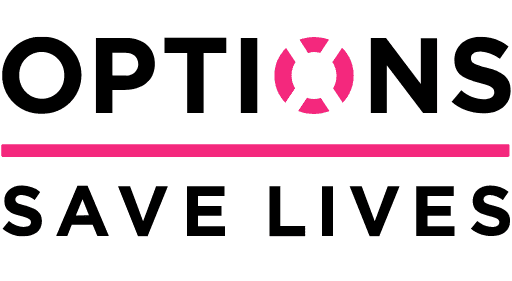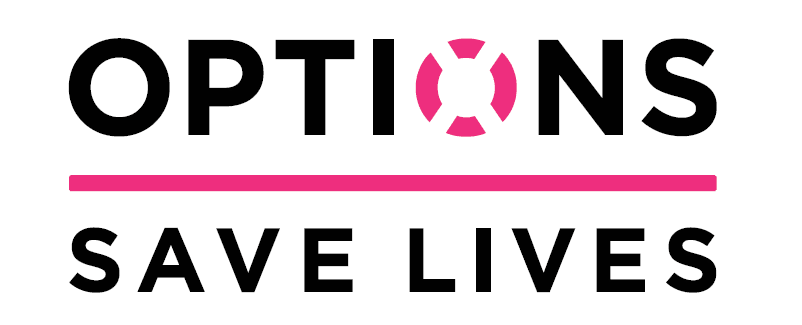One fatal overdose is one too many.
This is why it is so important to know your OPTIONS if you or someone you care for uses drugs. The Overdose Prevention Through Intensive Outreach Naloxone and Safety (OPTIONS) is a statewide initiative to improve the health of Mainers who use drugs. The initiative is a coordinated effort of the Maine Office of Behavioral Health (OBH) and other state agencies.
The OPTIONS initiative’s purpose is to promote harm reduction strategies, help people who use drugs on the journey to recovery and reduce the number of drug overdoses in Maine.
Through OPTIONS, each of Maine’s 16 counties has an OPTIONS liaison. The liaison is a licensed behavioral health clinician and often works with local emergency medical services (EMS) and law enforcement agencies.
Liaisons work alongside first responder counterparts to de-escalate behavioral health crises when possible and to connect individuals with services that will support their needs. Many liaisons are in recovery and know what the individual is going through and needs immediately, as well as long-term. Relationships between liaisons and those they support are often long-lasting.
OPTIONS is working to increase the number of Mainers who know about and understand the state’s Good Samaritan Law, in an effort to increase calls to 9-1-1 for medical assistance in the event of an overdose emergency. The program is also working to increase the distribution and availability of life-saving Naloxone (Narcan) across the state.
A person who is lost to an overdose no longer has an opportunity to recover. This is why it is important to educate those at-risk on safer drug use practices that reduce the chance of overdose.
OPTIONS strives to provide education about reducing the harm of taking drugs through practices that include not using drugs alone, having fentanyl test strips and Naloxone on hand, using clean syringes, and testing at least once a year for HIV and Hepatitis C.
OPTIONS liaisons often help connect people affected by drug use with services in their community to help them with basic needs, such as finding shelter, finding a place to detox, resources for clothing and nourishment, assistance with transportation needs, and much more.
If a person you care about is using drugs and you are concerned they might be in danger, there are some things you can do to help them stay safe and give them the best possible chance of recovery. OPTIONS also provides links to assistance for family members and friends.
Find out who your OPTIONS Liaison is and more about the initiative at https://knowyouroptions.me/.
Meet Your Oxford County Liaison

If you live in Oxford County, odds are you’ve seen Glenn Gordon out in the community. He’s the OPTIONS Initiative Liaison for the county—all 2,176 square miles of it.
Glenn works with six local Oxford County police departments plus the Maine State Police.
“I like to get out about once a week,” he said. “My role is to co-respond in situations involving substance use.”
The situations can range from robbery to intent to sell drugs to overdose. Glenn assists by doing what’s possible to keep the individual from going to jail by educating them about resources like treatment and recovery programs, shelter and food, and someone to talk with that understands the path they are on.
“In some situations, the officers may have to arrest the individual,” Glenn said. “However, in most instances, the police are generally empathetic.”
He receives referrals from police and human services agencies, often to people who have survived an overdose. “I provide the individuals with resources for access to harm reduction and treatment options. I stay in touch with as many as I can,” he said. “I don’t judge them. They may be on a different path and sometimes it’s hard to make traction. But that’s OK.”
Glenn participated in the panel discussion that followed the screening of As We Are last fall at Kezar Falls Theater in Porter. The film—written, acted and directed by high school students—explores the complexities of substance use from the perspective of teens.
“I feel like the film was my personal experience. I shared very candidly about my story as an adolescent,” Glenn said. “I think being in recovery myself makes me more compassionate and empathetic.”
Glenn said he started having trouble with drugs and alcohol at age 14, and first went to a 12-step program when he was 18.
“Most people, if push comes to shove, they put the drugs down. The solution isn’t just stopping using drugs for others. That’s where the addiction comes in – the disease,” said Glenn. “And the cure is connection. We need to remove the stigma. It’s a disease. We need to remember that.”
How can we suspend judgment?
According to Glenn, through one caring interaction at a time.




